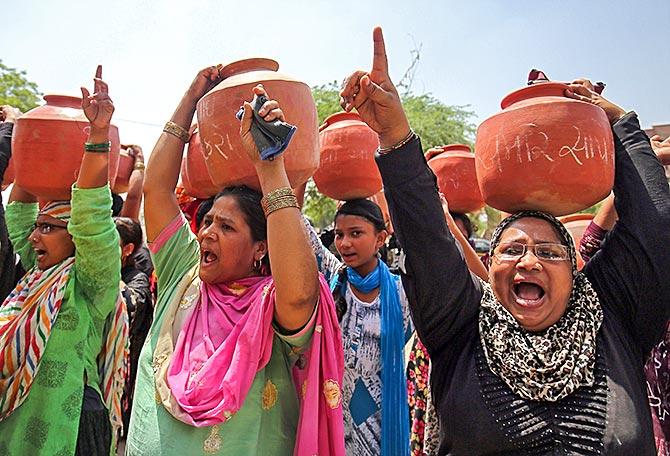Water shortage is likely to lead to political tensions and instability in the future, warns Simon George, President, Cargill India.

Among the most imminent threats to human survival over the next decade, Asia's biggest challenge will be securing the region's water future.
Over the last century, global water withdrawal has increased 1.7 times quicker than population growth in the same period.
And as much as 64% of these withdrawals are occurring in the Asian continent, according to the recent research report by the Economist Intelligence Unit, Liquidity Premium: Managing Asia's Increasingly Scarce Water Resources.
Projections suggest 40% of developing Asia will face severe water shortages by 2030, leading to critical supply-demand gaps.
Agriculture today consumes around 70% of the world's fresh water resources.
This along with other factors like rapid urbanisation and increased demand for water from the growing population of Asia has intensified stress on the region's water resources.
Water scarcity, over-exploitation and climate change, will continue to negatively affect food systems if current water management practices persist.

Water shortage is also likely to lead to political tensions and instability in the future, with access to freshwater sources being a highly debated issue across borders.
Increasing water scarcity will not only make trans-boundary water-sharing agreements more costly, but also weaken the ability of governments to collaborate with neighbouring countries.
In water-stressed countries, there are competing demands for water for urban, industrial, agriculture and the overall ecosystem upon which livelihoods depend.
Transparency and collaboration is needed to manage potential tensions in the region arising from water scarcity.
Encourage 'more crop per drop'
Promoting water efficient agricultural practices like crops that consumer less water, drip irrigation etc has significant potential to stop depleting water tables.
Some studies estimate that with focus on policies that aid higher water productivity, we can bring down the amount of water used for irrigation by 12%.
Over-extraction of groundwater for irrigation poses a serious threat, with privately sourced groundwater now accounting for the bulk of irrigation in large parts of India.
Rampant extraction of groundwater in India is testimony to the fact that there is no incentive to use resources efficiently.
China, on the other hand, despite having a larger population, uses 28% less fresh water than India, where energy subsidies for irrigation have incentivised farmers in several states to concentrate on water-intensive crops, such as rice.
Virtual water trade to encourage efficiency
In an increasingly water-scarce world, the virtual water trade as both a policy instrument and practical means to balance the local, national and global water budget has received much attention in recent years.
Considering a balance in policies advocating food self-sufficiency with the realities of growing water scarcity is key.
For countries in Asia that are facing water scarcity, importing water-intensive products could be more attractive than producing them domestically.
Technology to aid better water management
Moving farmers to more efficient water management systems will require long-term investments.
Technological innovations such as desalination and biotechnology can help improve the quality of water and help reduce water scarcity.
Wastewater management and treatment is also likely to increase.
Treated wastewater has been recognised as a potential source of water that can be both financially and environmentally sustainable.
Widespread adoption of these technologies depends on affordability and public acceptance could slow implementation.
For example, solar-powered desalination plants that supply irrigation systems to greenhouses have a lot of potential and can be built in dry areas, but it can be impacted owing to the affordability aspect.
There have been some successes, such as the solar irrigation pumps used in Karnataka.
Investing in such technologies to address water use-inefficiencies are essential to help the world develop sustainably.
Water is a critical resource that is used in all economic and human activities and its efficient management requires an integrated approach.
It requires full participation of all parties, from government, enterprises, and the public to overcome these challenges, both current and future.













 © 2025
© 2025